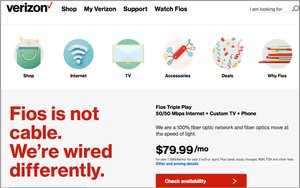Verizon, Yahoo Could Reshape The Advertising Industry
- by Tobi Elkin @tobielkin, Philip Rosenstein , July 26, 2016
 The blockbuster $4.8 billion sale of Yahoo’s core assets to Verizon Communications, announced on Monday, could generate deep shifts on the global advertising
industry’s playing field. Verizon plans to merge the Yahoo assets with AOL, which the company bought in 2015.
The blockbuster $4.8 billion sale of Yahoo’s core assets to Verizon Communications, announced on Monday, could generate deep shifts on the global advertising
industry’s playing field. Verizon plans to merge the Yahoo assets with AOL, which the company bought in 2015.
AOL head Tim Armstrong will spearhead the integration of the two companies along with Verizon EVP Marni Walden, a process that is sure to be tedious and lengthy.
The newly bolstered telecom giant hopes to compete with Google and Facebook in an industry where “scale is imperative.”
Yahoo brings with it an audience of 1 billion active worldwide users -- including 600 million active mobile users, a host of influential consumer brand partnerships, a powerful programmatic advertising and data platform and a robust editorial team.
Rivaling Facebook and Google is no easy task. Effectively integrating the myriad businesses will be paramount.
The benefits from the deal to both Yahoo/AOL and to the advertising industry are many, Jay Friedman, Goodway Group's COO explained to Real-Time Daily via email: “This is the best outcome marketers could have hoped for in the industry. This acquisition puts AOL on solid ground as the third platform CMOs must take a meeting with behind Google and Facebook.
"Balance of power is good. If AOL keeps an open ecosystem, they stand a very good chance of taking budget from Facebook and Google. Verizon/AOL/Yahoo now boasts a stack with as much reach and more O&O [owned and operated] inventory as Google and Facebook.”
Verizon will have to address the SMB (small- and medium-sized business) self-service abilities that the two incumbent ad giants offer, Friedman added. Tackling the self-serve offerings “is a must to sandwich the market with Fortune 100 plus the SMB market,” continued Friedman.
This could be good news for publishers, too.
“The industry will benefit as a whole from this deal,” Rich Sutton, CRO, Trusted Media Brands, told Real-Time Daily via email. “While Yahoo Finance and other Yahoo verticals are large in MUVs [monthly unique visitors], all are aggregators and curators of content -- not creators of content. Therefore, brands that are storytellers will win. With that said, brands and publishers that want to get their content distributed will now have the opportunity to, and it won’t just be about Facebook Instant Articles.”
Yahoo also promises to bring with it a likeability that is not usually associated with telecom companies.
“For all the wobbliness of Yahoo’s brand identity, the Yahoo brand still hold a lot of consumer affinity. Consumers LIKE the Yahoo brand,” explains Shar VanBoskirk, Forrester's vice president and principal analyst. “Depending on how Verizon plans to leverage that, it could be a nice boost in an industry like telecom where most subscribers disdain even the providers they are quite loyal to."



When Verizon bought AOL, I thought “Whoa, what a retro move. Do they really see a future in adtech? What are they smoking?” Now, with the Yahoo deal, it’s clear they’re smoking the adtech crack pipe, and thinking about all the ways they can track people, put crosshairs on their eyeballs and eardrums, and annoy them everywhere. Good luck with that.
The market is in the process of blowing up that business. Hundreds of millions of human beings are already running tracking protection, blocking ads, or both. If this be a boycott (and it is), it’s the biggest in human history. Tracking people without their express, willing, conscious interest, knowledge and consent—is what Yahoo, AOL and its zillion partners and competitors do. They occupy what’s left of a market 85% controlled by Google and Facebook.
Apparently Verizon thinks it can compete with Google and Facebook in this creepy business. They are wrong. Google and Facebook are gigantic companies that users can easily see, interact with and understand, even if they don’t like knowing they are tracked like animals constantly. Google and Facebook's businesses are also relatively bounded and easily understood. Not so with the fraud- and malware-filled four-dimensional shell game that comprises the rest of adtech today.
My own concern with Yahoo going to Verizon is what happens to the millions of Yahoo users, including paying customers, who Verizon doesn't care about, because Verizon is clearly only interested in advertising-funded assets. In my own case I am a pro customer of Flickr (a Yahoo property) with 65000 photos getting 10000 visits per day. My guess is that Verizon has no idea at all what to do with customers like me, and will screw us over.
For the millions of human beings who are users and customers of Yahoo properties, risk of abandonment by Verizon is the only real story. Not how Verizon will compete with its betters in the annoyance business.
I guess when we talk about "the global advertising industry" we really mean the digital media buying industry. Or do we see major changes in television or radio or magazines taking place because of the Verizon- Yahoo deal? Why must everything that happens in digital media venues be headlined as impacting the entire advertising industry? Will the way that advertisers develop TV or radio or magazine ad campaigns or measure them be dramatically altered---or reshaped---by Verizon, now that it has Yahoo? Will billions of ad dollars finally flow away from 'linear TV" to Verizon as part of this great reshaping? Somehow, I doubt it.